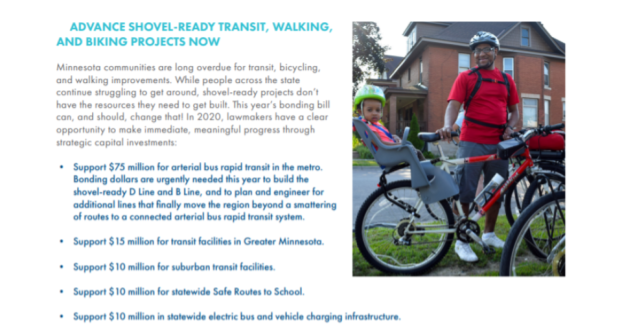
By Sophia Pechaty
A record-setting Transportation Summit, called “Commute Revolution,” happened just before Memorial Day. (If you missed it, the webinar will be available here). The “Seismic Approach to Transforming Transportation” was hosted by Move Minneapolis and featured a panel of six experts from across the country. The webinar was an exciting way to learn more about the nuanced ways different cities are tackling issues related to transportation. As you may know, transportation is the #1 contributor to climate pollution in Minnesota and the nation - so this summit was timely and relevant. While each panelist spoke to a unique area of expertise, one encouraging theme ran throughout and connected each specific message: Hope.
The main takeaway from the summit was one of hope, and a call to action: We should be using pandemic-era disruptions to our normal lives as a way to step back and really analyze systematic inequities. As our communities begin operating again, we don’t want to simply go “back to normal,” but rather take a step forward. We have this incredible opportunity to radically redesign some of our most flawed systems in a way that prioritizes both our environmental impact and the resiliency of our communities. As Michael Kodransky of the Institute for Transportation and Development Policy put it, we need to redefine the “ingredients” of a healthy city.
For instance, as California YIMBY’s Matthew Lewis (follow him on Twitter) pointed out, transportation policy is deeply connected to housing and the inequities it reinforces. While some residents might oppose funding for sustainable transit projects because of cost, bus and rail investments are in fact important pieces in dismantling housing inequities that date back to the racist redlining of neighborhoods. Additionally, the costs of car-oriented traffic outweighs the expenses we could be investing in more sustainable options.
We are overdue for a large-scale reconceptualization of how we design our streets. Brookings Institute's Adie Tomer noted that our neighborhoods aren’t as resilient as they could be because we haven’t been building them “for proximity”. One lesson the COVID-19 pandemic has been making more obvious is that communities designed to make car ownership a necessity are unstable, and don’t have a place in a future of safer streets and healthier transportation habits.

So how can we take action for our neighborhoods, our climate, and our environment today, during this pandemic? One powerful way is by passing a state bonding stimulus bill that funds transit and safe routes to school. For a just, sustainable future, we must recenter our roads around people using buses, bikes, and walking. The Transportation Forward bonding proposal is an effective piece of proposed policy that would have positive impacts throughout the state. COVID-19 has placed us in extraordinary times. Investment in clean transportation options like Bus Rapid Transit are more important than ever.
Sophia Pechaty is a Peace and Justice Studies major at Wellesley College and a Sierra Club Clean Transportation for All summer intern.
